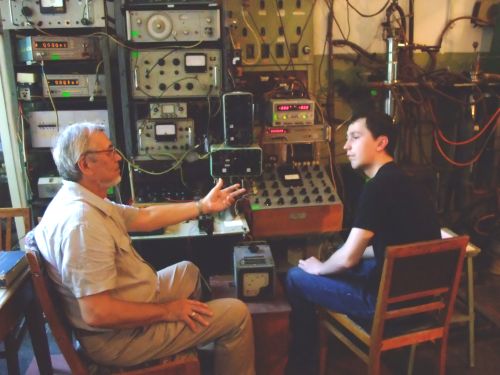 Group members:
Group members:Dr. Sc, Prof., Leading Researcher, Yuriy N. Chiang (Group Leader);
Researcher Ph.D Mikhail O. Dzyuba.
TRANSPORT PHENOMENA IN NORMAL METALS AND STRONGLY CORRELATED SYSTEMS
 Group members:
Group members:
Dr. Sc, Prof., Leading Researcher, Yuriy N. Chiang (Group Leader);
Researcher Ph.D Mikhail O. Dzyuba.
Directions of scientific research:
1) Experimental study of the spin Hall effect (SHE) in the normal metals. Direct electrical measurements of the relativistic spin Hall effect due to spin-orbit interaction were carried out for the first time in normal aluminum and tungsten metals using unpolarized injection current. The nonlinear behavior of the transverse chiral voltage in uncompensated aluminum detected in a magnetic field can be considered the first direct observation of the internal (band) SHE, confirming the existence of nonequilibrium spin dynamics in momentum space. This is also indirectly confirmed by the absence of SHE in compensated nonmagnetic tungsten metal [1, 2].
2) Transport and magnetotransport in the conducting compounds with strong electron correlations. The transport properties of lanthanum and erbium cobaltites were carries out. The results of those investigations and the researches of other authors were summarized in the review, in which the basic physical mechanisms that determine the transport properties of perovskitelike materials are considered. It is given main experimental results for lanthanum and erbium cobaltites, and it is considered the influence of the polycrystallinity factor of the samples on their galvanomagnetic properties [3].
The list of cited publications of our group (2017 – 2020):
1. Yu.N. Chiang, M.O. Dzyuba, Intrinsic spin-Hall effect in aluminum // EPL (Europhysics Letters) 120 (1), 17001 (2017).
2. Yu.N. Chiang, M.O. Dzyuba, Non-equilibrium Spin-Hall effect in irregularly shaped
aluminum and tungsten samples // Physica B: Condensed Matter, 558, 44-48 (2019).
3.
Chiang Yu. N., M. O. Dzyuba, Electrical transport in the lanthanum and erbium cobaltites (Review Article) // LTP, 46, 6, 671-681 (2020).
4. Yurii Nikolaevich Chiang, Mikhail Olegovich Dzyuba,
Nonequilibrium Spin-Hall Detector with Alternating Current // American Journal of Modern Physics
2020; 9(1): 7-10.